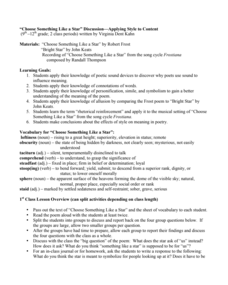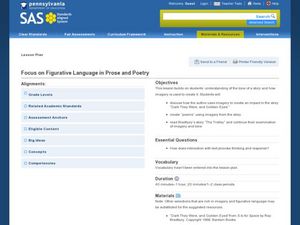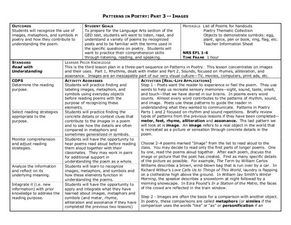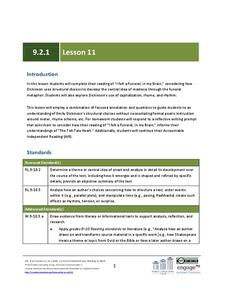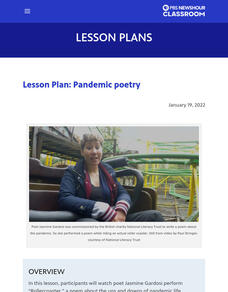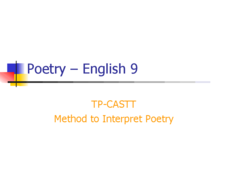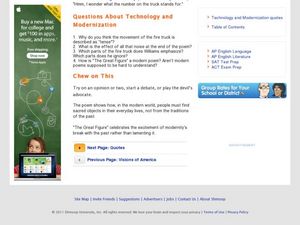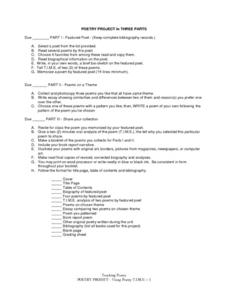Robert Frost Farm
“Choose Something Like a Star” Discussion—Applying Style to Content
Robert Frost's "Choose Something Like a Star" and John Keats' "Bright Star" provide the text for a two-part instructional activity in which class members analyze the effects of style on meaning in poetry. Randall Thompson's song cycle...
Curated OER
Focus on Figurative Language in Prose and Poetry
Students place emphasis on the use of figurative language when analyzing prose and poetry. In this figurative language lesson plan, students explore the tone of a story and its imagery. Students read and discuss how the author uses...
Curated OER
Patterns In Poetry: Images (Part 3)
Students explore imagery in poetry. For this poetry lesson, students examine how the use of metaphors and similes aid in reading comprehension. Multiple resources are provided.
Curated OER
Lincoln is in the House! ("Name-Dropping" Poems and the Power of Connotation)
“What’s in a name?” Just about everything. Barack Obama, Vincent van Gogh, Justin Bieber. Famous names evoke a multitude of reactions and poets often use the names of famous people in their works precisely because names carry...
Learning for Justice
Maya Angelou
Maya Angelou's poem, "Still I Rise", offers young scholars an opportunity to consider how poets use literary devices to create powerful messages. After a close reading and discussion of the poem, class members reflect on how they can...
Curated OER
Revision
Young poets learn the value of using a thesaurus when crafting and revising poems. They examine poems rich in figurative language and then a revised version with the figurative language removed. To demonstrate what they have learned,...
Houghton Mifflin Harcourt
Give It All You’ve Got!: English Language Development Lessons (Theme 2)
Go beyond the textbook to gain a better appreciation for the English language. A series of ESL lessons help expand the concepts found in Theme 2: Give It All You've Got. The second lesson in a three-part unit incorporates strategies such...
EngageNY
Grade 9 ELA Module 2: Unit 1, Lesson 11
The capitalization rules are strict and inflexible—until you experience the fluid beauty of an Emily Dickinson poem. Ninth graders test their existing knowledge of language arts conventions with the many bent grammar rules in "I Felt a...
K12 Reader
Alliteration: It’s a Zany Zoo!
Elephants eat and cheetahs chase in this zany zoo! Kids survey a list of ten animals before adding in an adjective and verb for each to form an alliterative phrase or sentence.
Reed Novel Studies
A Wrinkle In Time: Novel Study
Fathers and daughters often create a bond of great strength. Is Meg's bond strong enough to save her father? A Wrinkle In Time follows Meg and her friends as they find themselves in a supernatural world; Meg just hopes she finds her...
Curated OER
What are the Elements of Poetry
Students read the poem "Ode to Pablo's Tennis Shoes" and analyze the form, figurative language, and mood. They complete a T-chart containing what they have learned about Pablo and the evidence from the poem supporting their conclusions.
Alabama Learning Exchange
Poetry-English 9
Are your readers lost in the world of poetry? Show them this basic presentation to study elements of a poem. They learn the importance of the title, paraphrasing, connotation, tone, shifts, and theme.
Curated OER
Can You Figure Language?
Eighth graders study similes and metaphors and how to explain and create them. After a lecture/demo, 8th graders access websites and worksheets imbedded in this plan to create their own writing.
Curated OER
Lesson: Paint Inspiring Words
The painting Three Young Girls circa 1620, was believed to be painted after the death of the subjects' mother. Art enthusiasts analyze the image details to determine if they come to the same conclusion. They then use the sensory details...
K12 Reader
The Road Not Taken
"The Road Not Taken," is the focus of an exercise that asks readers to identify the figurative meaning of Robert Frost's poem.
Texas Education Agency (TEA)
Simile and Metaphor (English III Reading)
The key idea in this interactive exercise designed for high schoolers is that figurative language, especially similes, and metaphors, add layers of meaning to a text. Users examine examples from speeches, ads, movie dialogue, and poems,...
abcteach
Dragon Alliterations
You don't have to slay the dragon in this activity. Young writers review poetic devices with a set of worksheets about alliteration and similes. Once they finish waxing poetic about their dragon friends, they craft a final acrostic poem.
Welcome to Ms Bosello's Class!
Alliteration Worksheet
Alliteration and imagery are two vital parts of any well-written poem. Encourage your young poets to include these devices with a set of activities designed to get them thinking, writing, and creating.
Curated OER
"The Great Figure": Theme of Time
Click on and read the poem "The Great Figure" by William Carlos Williams, and then answer the four short answer and essay questions based on themes therein. A link to the summary and analysis questions is also included.
Curated OER
"The Great Figure": Theme of Technology and Modernization
Learners respond to four short answer and essay questions based on themes in the poem "The Great Figure" by William Carlos Williams. The poem itself is not included, but the questions could lead to some very interesting class discussions!
Teaching English
Poetry Project in Three Parts
It’s poetry T.I.M.E! Individuals use the T.I.M.E. format (T = Title, thought, and theme; I = Imagery and figurative language; M = music and sound; E = emotion) to study a poet, collect poems that have a similar theme, and create a...
Curated OER
Out of the Dust: Figurative Language
Students find examples of figurative language in "First Rain" in Out of the Dust. In this Out of the Dust lesson, students takes notes on various type of figurative language and identify examples of each type in the poem.
Curated OER
Figurative Language 2
Students read nursery rhymes and advertisements to identify examples of figurative language. As a class, students discuss the use of figurative language and its effectiveness in advertising, children's books, rhymes, poetry, etc. ...


